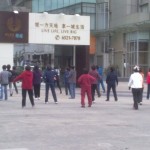Shanghai Street View: Muffling Merrymakers 沪经动向:消除噪音
 Shanghai has a strong reputation for accomplishing difficult tasks, but I really think the city could find it hard to implement its latest new law targeting bothersome outdoor noise. The law, which came into effect at the end of February, takes aim at one of the city’s most common pastimes: the outdoor dancing squad. The term “dancing squad” is really just my own creation, as these kinds of outdoor performances aren’t really limited to dancing. They run the range from groups of women doing calisthenic-like dances in the morning, to people ballroom dancing and singing karaoke music outside parks.
Shanghai has a strong reputation for accomplishing difficult tasks, but I really think the city could find it hard to implement its latest new law targeting bothersome outdoor noise. The law, which came into effect at the end of February, takes aim at one of the city’s most common pastimes: the outdoor dancing squad. The term “dancing squad” is really just my own creation, as these kinds of outdoor performances aren’t really limited to dancing. They run the range from groups of women doing calisthenic-like dances in the morning, to people ballroom dancing and singing karaoke music outside parks.
In fact, these “performances” are really more like the western equivalent of exercise classes that usually take place at gyms. The big difference is that the Chinese groups meet and perform in big outdoor open spaces, often without any clear leader. The majority of participants are usually women, but the other common theme to most of these activities is the presence of a big audio speaker in the midst of all the performers that usually plays peppy music, often at very loud volumes.
I suspect the origin of these groups dates back to several decades ago when China wasn’t very wealthy and people didn’t have much money to spend on entertainment. So they simply made their own free alternative, which is what these noisy dancing squads have become for many older people living on limited incomes.
It’s the boisterous music at the center of these dancing squads that’s one of the main targets of the new Shanghai law, which aims to make the city more liveable for nearby residents who often complain of the loud noise that comes from such gatherings. As a longtime China resident, I can say with confidence that these squadrons are quite common and are hardly limited to Shanghai, though they often surprise many westerners visiting the country for the first time. On one recent walk along bustling Sichuan North Road near my home in the Hongkou district, I passed no less than 6 different dancing squadrons in just a 3 block distance, each with its own loud speaker often competing with music from another speaker just 20 or 30 meters away.
The new law aims to start tackling the problem at the city’s many parks, home to some of the biggest groups due to the widespread presence of big open spaces. But the law doesn’t apply to areas outside parks, which had many park workers upset since many singers and dancers simply moved their activities to just outside the parks in the first days after the law took effect. Many of these dancers are apparently addicted to their pastime, much the way some westerners are addicted to their daily exercise classes at the gym.
From my perspective, I certainly can sympathize with the residents who can’t sleep at nights or get woken up early in the mornings due to loud music from these dancing squads drifting up to their windows. Luckily for me, the building where I live isn’t next to any parks or big open spaces where these people like to congregate, so I don’t have to deal with the problem in my own home.
But from a bigger perspective, I do have to admit that I find these squadrons have a certain charm about them and give the city a bit more color. Perhaps that’s because I’m a foreigner and find such outdoor gatherings somewhat different from anything you see in the west. Chinese people may feel quite a bit differently and simply find them a nuisance, much like noisy and often unsanitary hawkers who often clog the city’s streets.
At the end of the day, I suspect these colorful but often annoying groups of performers are probably headed for extinction, partly because of new laws like the one in Shanghai but mostly because they represent a pastime for older people who grew up in a different time. Young people in China now have plenty of extra income to spend on entertainment, and most would prefer to pass their evenings in a karaoke or Internet bar, or at a movie or in a coffee or tea house with their friends.
When they finally pass into extinction, thousands of Shanghai residents who have suffered for years with the blasting music of these dancing squads will inevitably be quite pleased. But at the same time, the city will also lose a unique part of its history and charm, as it marches away from its simpler past and towards a future of becoming a major, modern financial and cultural hub.
<
